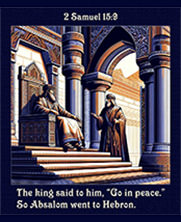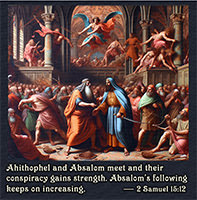2 Samuel 15:1–12 . . . Bible Study Summary with Videos and Questions
“Absalom’s Conspiracy Against David”
Today we’ll read about the start of Absalom’s uprising. This handsome, brilliant, gifted young son of David instigated a rebellion throughout the kingdom, secretly working against his own father by attempting to take the throne for himself. He eventually became so successful that David, with all his court, had to flee the city as an exile. Imagine that! The man whom God had set to be a king over Israel, the man who was to reign over all twelve tribes, the man to whom God had given a throne, now had to flee like a common criminal because of his moral failures. Throughout all of this, David’s heart was penitent and rested upon God. He’ll acknowledge the fact that these things were the result of his own folly, and he’ll trust God to work it out. It’s a beautiful picture of what our heart attitude should be when we fall into sin and failure, allowing evil results. There’s never a word of complaint from David, never any attempt to blame God, no bitterness, simply the recognition that God can and will work this out.
Note that two sub-sections of today’s twelve-verse passage begin with a reference to time (vv. 1, 7), providing two complementary panels. The first six verses explain how Absalom undermined popular confidence in David, the Lord’s anointed, for four years. The last six relate his final preparations to lead a military revolution against David.
Whatever the reason, Absalom exhibited the same, patient scheming and relentless determination that he’d already shown when he set out to avenge the rape of his sister (chapter 13); his hatred for Amnon at least had some excuse. But here in chapter 15, it’ll become clear that he had no affection for his father either. Apart from his love for his sister Tamar, he appears to have been a cold, ruthless, ambitious man.
[Note: Click the link to This Week’s Passage near the bottom of this page to read today’s Scripture.]
Absalom Steals the Hearts of the People of Israel (2 Samuel 15:1–6)
The kingdom was ripe for overthrow and Absalom realized it. He began to take steps to endear himself to the people. No doubt, he would have been a great politician. Come to think of it, thats exactly what he was! Every day, he’d station himself on the road leading to Jerusalem’s gate (just out of sight of the city and his father, no doubt). What an impressive sight he must have been. A strikingly handsome man with a head of hair that women would die for, he probably parked his chariot in sight of all who passed by. He didn’t use chariots for speed but to make an impressive procession. When he went anywhere, he didn’t walk; he rode in a chariot, hitched to fine horses, and had a 50-man bodyguard jogging ahead of him wherever he went. His retinue projected the intended message: Absalom is a very great and important man (v. 1). Every visual impression smacked of royalty and class. And he’d call out to those passing by, asking from where they came and why they’d come. He greeted all in a way they’d remember.
Looking more closely, we see that Absalom was a very self-centered person in that he: promoted himself and secured military weapons and strategy (v. 1); criticized his father’s administration publicly (vv. 2–3); promised to rule better than David (v. 4); used personal charm and flattery to gain support (v. 5); and exalted himself over David (v. 6). All of these activities were intended to attract attention to him, reminding the people that he was the natural heir to David’s throne (cf. 1 Kings 1:5). He began to take full advantage of the perks of being the crown prince to advance himself in people’s eyes.
As Warren Wiersby writes, David had won the hearts of the people through sacrifice and service, but Absalom did it the easy, modern way, by manufacturing an image of himself that the people couldn’t resist. David was a hero in his kingship; Absalom was only a celebrity, more like an opportunistic villain. His statement contrasts the enduring authority of a true leader with the fleeting appeal of a demagogue.
But there’s more. Not only did Absalom come out looking good, he caused David to look very bad. He wasn’t only exalting himself, he also began to undermine his father’s reputation by pointing out his father’s weaknesses. When Absalom learned that travelers had come to Jerusalem to seek justice, he’d tell them that he was terribly sorry to inform them that the king had made no provisions for judging cases. This, of course, was a lie, for we just read about David hearing a “widow’s” case and ruling in her favor — see last week’s summary. [Note: Ancient kings were more than heads of government, they were also the “supreme court” of their kingdom. If someone believed that a local court didn’t give them justice, they appealed to a king’s court where the king or his representative would hear the case. David’s kingdom had a judicial system where most disputes were settled at the local level by tribal elders or Levites. But if a person didn’t get the justice he desired, he or she had a right to appeal directly to the king, in the same way that the wise woman from Tekoa did (14:1–20).]
To stir up dissatisfaction with David’s government, Absalom would also tell the travelers that, from what he’d been told of their case, they’d be very disappointed since a judge would have ruled in their favor if only David had appointed someone to hear the case. Bemoaning the weaknesses of King David’s judicial system, Absalom promised that, if he were appointed judge, he’d bring justice (v. 4). He left everyone with the impression that you just couldn’t get justice so long as David remained on the throne.
And then, using great cunning, Absalom made it known that if he was one of those judging in Israel, he’d see to it that such people were heard and that he’d rule in their favor. Seemingly, one couldn’t get justice with David, but, with Absalom, it would be an entirely different matter. Not only was Absalom an outright liar (in saying there was no one to hear their case), he was a hypocrite. Just what kind of “justice” would he have meted out? The kind of “justice” he felt that Amnon deserved? Obviously, Absalom was no friend of justice or of the oppressed. He simply acted as a politician by getting people to think that he was on their side. Sadly, it worked. He won the hearts of the people of Israel. He’d schemed consistently for four years. David had no clue that his son was actively seeking to undermine him with the people.
The third piece of Absalom’s public relations campaign was a kind of baby-kissing politician role that we in the twenty-first century see all too often (vv. 5–6). He was skilled at projecting a “man of the people” image. In obvious displays, he wouldn’t let others bow down to him but he’d lift them up, shake their hand, and embrace and kiss them. He campaigned to be “the people’s king who loved the common man.” Obviously, this was all a sham that was perpetrated by image building, empty promises, and flattery. While David was the man for all seasons, his handsome son was merely the actor. Yet, for the moment, this hypocrisy was all that was needed to help Absalom achieve kingship.
It’s reasonable and common to suggest that impatience was a major contributing factor, or even the catalyst, for Absalom’s greatest sin: treason/rebellion against God’s anointed king. He seemed to stand nearest to the throne; but he sinned by seeking kingship during his father’s life, endeavoring to dethrone him and sit in his stead. His clever approach made him able to subvert and divide David’s kingdom without saying anything specific that could condemn him. He was now ready to make his move. His actions reveal a proud impatient figure who overcomes loyalty, morality, or deference to God’s timing, forcing him into treason and deception, becoming his ultimate and fatal sin.
Absalom Plans His Coup of David’s Kingdom (vv. 7–12)
7At the end of four years, Absalom said to the king, “Let me go to Hebron and fulfill a vow I made to the Lord. 8While your servant was living at Geshur in Aram, I made this vow: ‘If the Lord takes me back to Jerusalem, I will worship the Lord in Hebron’” (2 Sam. 15:7–8).
Absalom spent four years (v. 7, probably 980–976 BC) quietly planning his coup. If he had staged a palace coup in Jerusalem, David’s mercenary army would have immediately crushed him. But Hebron was far enough away to give his claim to the throne, adequate space to be accepted, and sufficient time to draw followers to his cause. Hebron also had the honor of once being David’s royal capital (2:1–4), a history that lent credence to Absalom’s claim to the throne.
David was, at that time, building his palace in Jerusalem, then constructing a new dwelling place for the ark, and finally making preparations for the temple’s construction. These may have been some of the reasons that David wasn’t meeting the needs of his people the way he ought to have done — assuming that Absalom’s criticisms were valid. This may also explain David’s surprise when Absalom’s coup began.
After four years of running David down and building himself up in the eyes of the people, Absalom was ready to act. He planned to make his debut as king at the same place David had done, where he was born: Hebron (2 Samuel 3:2–3). It was an ancient Yahweh sanctuary (Genesis 13:18) where he was to fulfill some supposed vow made to Yahweh while he was in exile.
But he needed a ruse so David wouldn’t suspect anything when 200 admirers of his would accompany Absalom when he left the capital. So he went to his father and told him that he’d made this vow while he was living in Geshur: If God ever granted him the privilege of returning to Israel, he’d pay his vow to the Lord in Hebron. Now, he indicated, was the time to do so. Sadly, he committed treason under the guise of worship, knowing that the appearance of spirituality could work in his favor. Thus, David granted him permission to leave for Hebron (v. 9), sending him away “in peace.” However, his peaceful departure certainly wouldn’t result in “peace.”
Seeing in v. 10’s — “As soon as you hear the sound of the trumpets, then say, ‘Absalom is king in Hebron’” — it’s clear that he counted on the hope that most of the people of Israel would see this as his succession, not his treason.
So Absalom took 200 of his men from Jerusalem to Hebron. The 200 invited guests weren’t part of his secret conspiracy, but had been handpicked because of their influence in Israel — and because Absalom knew that they’d likely follow him when the secret plot was revealed. They were needed to lend credibility and acceptance to the new kingdom, since they’d be named as supporters. And they had no idea what he had in mind. Once in Hebron, he hatched his plan for the announcement of his rise to the throne to be made simultaneously throughout Israel (v. 11).
Absalom sent word, via secret messengers, throughout the tribes of Israel that, when the trumpet was blown, that would be the signal for them to proclaim their allegiance to him, rather than to David. He and his plan were successful. The coup was announced as if it were already complete, discouraging any resistance. The 200 guests were caught in the middle: Naturally inclined towards Absalom, they’d soon be perceived by all as being on Absalom’s side, whether or not they’d have chosen this allegiance on their own.
As the news of Absalom’s ascension to the throne spread, it gained momentum; more and more people backed him, creating a serious threat to King David. The Bible explicitly states that “the conspiracy gained strength, and Absalom’s following kept on increasing”(v. 12). A messenger even reported to David, “The hearts of the people of Israel are with Absalom” (v. 13). In addition, he’d managed to recruit Ahithophel the Gilonite, David’s counselor. He was a most gifted man; his counsel was exceedingly wise (16:23). The advice of Ahithophel, which he gave in those days, was as if one had inquired of the words of God; both David and Absalom regarded Ahithophel’s advice quite highly.
† Summary of 2 Samuel 15:1–12
Today’s twelve-verse passage describes the beginning of Absalom’s calculated conspiracy to seize the throne from his father, King David. Absalom begins by presenting himself as a royal figure, acquiring a chariot, horses, and fifty men to run before him, projecting power and prestige (15:1). He positions himself at the city gate, where disputes and legal cases are brought, and wins the hearts of the people by showing personal attention and feigned concern for justice (vv. 2–4). Absalom tells those who come to him that they have a valid case but laments that there’s no one appointed by the king to hear them, implying a lack of justice in David’s administration. He then humbles himself by warmly greeting each person and embracing them, further securing popular support (vv. 5–6). Over four years, this subtle campaign shifts the loyalty of many Israelites toward Absalom.
When Absalom deems the time right, he seeks David’s permission to go to Hebron under the pretense of fulfilling a vow to the Lord made during his exile in Geshur (vv. 7–9). With David’s blessing, Absalom sets his plan into motion, sending secret messengers throughout Israel to proclaim him king once the signal is given (v. 10). He gathers a large number of followers, including two hundred men from Jerusalem who accompany him, unaware of the true nature of his mission (v. 11). He also secures the allegiance of Ahithophel the Gilonite, David’s trusted counselor, whose support greatly strengthens the rebellion (v. 12). This passage marks the strategic and deceitful beginning of a full-scale revolt against David’s reign.
Key points with verse references:
• Absalom displays royal pomp by acquiring a chariot, horses, and fifty men to run before him, impressing the people (v. 1).
• He positions himself at the city gate to meet those with disputes, suggesting the king’s justice system is lacking (vv. 2–4).
• Absalom secures the loyalty of the people through personal contact, greeting them warmly and humbly (vv. 5–6).
• After four years, Absalom uses the pretense of fulfilling a vow in Hebron to gain David’s permission to leave Jerusalem (vv. 7–9).
• While in Hebron, Absalom launches his conspiracy, sending messages across Israel, gathering supporters, and winning over Ahithophel to his cause (vv. 10–12).
This Week’s Passage
2 Samuel 15:1–12
New International Version (NIV) [View it in a different version by clicking here; also listen to chapter 15 narrated by Max McLean.]
Summary Video: “The Second Book of Samuel”
† Watch this introductory video clip created by BibleProject on bibleproject.com.
- Q. 1 What are the elements of Absalom’s public relations campaign to win over the people to his side?
- Q. 2 How effective were they?
- Q. 3 Which of David’s weaknesses did Absalom exploit?
- Q. 4 What campaigns of dis-information today seek to discredit God’s reign or encourage believers to stray from the faith?




